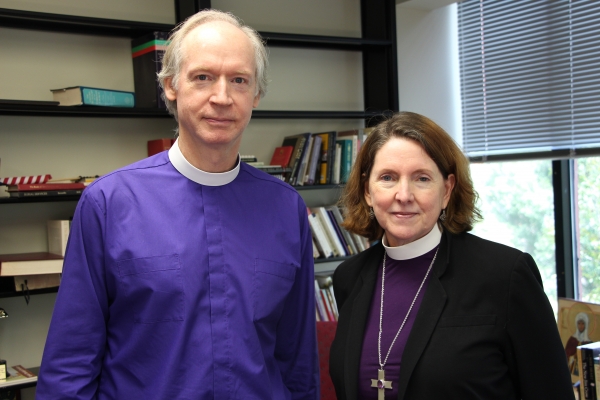
Our hearts ache with the images and stories of the unprovoked attack on the people of the Ukraine. In this violent onset of war, we who follow Jesus turn to prayer. In our shock and and sadness we trust in prayer because we believe that prayer has the power to change human hearts, and provide “a way where there is no way.” We know that Jesus is standing with the innocent and vulnerable, and so we stand with the people of the Ukraine and all of Europe, as we offer our hearts in solidarity and in hope.
O God, you made us in your own image and redeemed us
through Jesus your Son: Look with compassion on the whole
human family; take away the arrogance and hatred which
infect our hearts; break down the walls that separate us;
unite us in bonds of love; and work through our struggle and
confusion to accomplish your purposes on earth; that, in
your good time, all nations and races may serve you in
harmony around your heavenly throne; through Jesus Christ
our Lord. Amen.
We share with you now the powerful message and prayer for peace from our brother bishop, the Rt. Rev. Mark Edington, bishop of the Convocation of Churches in Europe. May the bonds of our beloved community be a witness for peace in the face of violence and war.
TEXT FROM BISHOP EDINGTON'S MESSAGE:
The Episcopal Church has been in Europe for more than two hundred years. Our churches have seen Europe’s wars unfold. They’ve lived and endured in the midst of the destruction and depravity that war brings.
Our parish here in Paris set up a field hospital during France’s war with Prussia in 1870 that treated wounded soldiers. Our parish in Munich created a clinic during World War I that treated wounded German soldiers and fed families who had no income.
And our churches here have been casualties of war. A church of the Convocation worshipped in Dresden, Germany, until it was destroyed by bombing. Our parish in Munich was closed by the Gestapo in 1942, and its library of eight thousand books was burned.
Most of our churches here were closed during the Second World War. And our cathedral in Paris was used as a military chapel by the occupying German forces.
Perhaps more than any other part of the Episcopal Church, our churches in Europe have lived through the horrors of war—and the pointlessness of war, too. The cathedral's cloister, a memorial to the dead of the twentieth century’s wars in Europe, is our silent testimony to that truth.
And for a long time—almost eighty years—we have believed that the futility of war was enough to deter it. Today, with war unleashed in Ukraine, we have been proven wrong.
Our faith teaches us that we must stand with the vulnerable and the oppressed. And at the same time, our faith teaches us that we are meant to be followers of the prince of peace, of the one who taught us that violence is always a compromise with evil.
It is hard for us to reconcile those two teachings today, when innocent people are dying at the hands of a military onslaught. Our prayers feel insufficient to defend those cowering in fear and exposed to bullets and bombs.
But we know that the place where war lives is in the human heart. As the prophet Jeremiah teaches us, the heart is devious above all else; and it is in the devices and desires of hearts resisting God’s call to live in love that the first seeds of war take root.
We often begin our prayers with the words “Almighty God.” But the deeper truth of our Christian faith is that we believe humanity has been redeemed, and the world forever changed, by an all-vulnerable God—a god whose love is finally victorious through the vulnerability of a naked man nailed to a cross. It is from that seeming defeat that the victory over death and sin is won forever—even the sin that lies at the heart of war.
And so as we begin our season of Lent, we are called to give up our easy complacency about the durability of peace. We are called to consider again the reminders in our midst of war’s relentless cost to human life and God’s hope. And we are called to pray, and speak, and to labor for the truth that Christ has called us to transform this broken world through the hard work of love.
God of timelessness,
From chaos and disorder
you brought forth the beauty of creation;
From the chaos of war and violence
Bring forth the beauty of peace.
God of compassion
You saw the humanity of the outcast and the stranger;
Help us to see the evils of our hatreds and suspicions
and to turn them into the embrace of your Beloved Community.
God of peace,
Through your love on the cross
You overcame the power of violence and death;
Turn us away from the love of power
That we may transform a warring world
through the power of your love. Amen."

